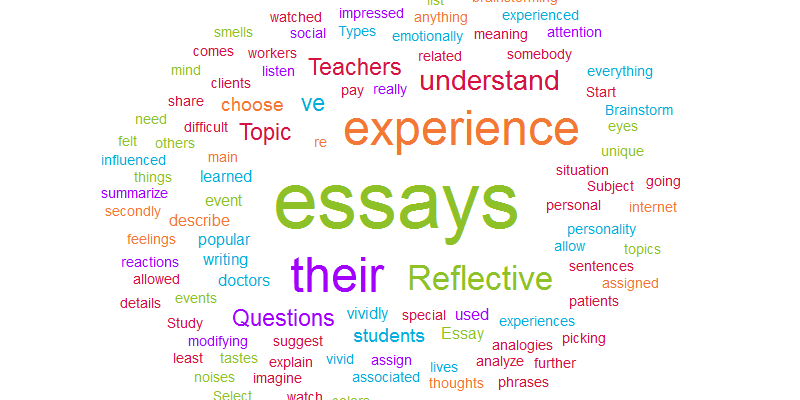How to Write a Reflective Essay

Reflective essays allow you to share experiences and tell others what you’ve learned from them. You may choose to write about a certain event from your life or anything that impressed you and influenced your personality.
There are two main things you must do. First, you have to vividly summarize and describe your experience, place, and people associated with it. And secondly, you must explain your feelings, reactions, and thoughts about this experience.
1. Choose Your Topic
You may get a topic assigned or you can be allowed to choose your topic. If you have no idea what to write about, think of what events in your life were really special, or just look for the most popular topics on the internet. However, even if you choose some popular topic, we suggest modifying it and making it more unique and personal.
2. Study Your Subject
To remember an event you’re going to write about more vividly, take your time, close your eyes and imagine this situation. If your topic is related to something you’ve read, heard or watched, you may want to read, watch, or listen to it once again.
3. Brainstorm
Start writing everything about this subject that comes to your mind. You will need to describe it as vividly as you can, so pay your attention to such details as tastes, smells, noises, and colors. Use vivid adjectives that will help your audience feel and experience what you’ve felt and experienced. While brainstorming, it’s not really important how you write — you may write whole sentences or just short phrases that can be used further.
4. Select Reflection Questions
There are some questions that may help you make your story more interesting. We suggest picking at least three questions from the list below.
- How did you feel about it?
- Why did you feel this way?
- What did you notice?
- What would you like to do differently?
- What was so special about this experience?
- How can you use this experience to help somebody?
- What is the meaning of this experience for your life?
- Was it somewhat similar to another event in your life?
- What did you learn from it?
- How can you apply this experience to your life? Can it help you in your career or studies?
- What was socially challenging about it?
- What did it help you understand about your personality?
- Was it emotionally important or difficult?
- How did it change the way you think?
- Is this experience related to your understanding of the universe or God?
- What was unexpected about it?
- Why did you react to it the way you did?
5. Answer Questions
Now read selected questions and answer them. Don’t forget that this kind of essays isn’t formal, so you can be creative and use your imagination.
6. Determine the Main Idea of Your Essay
The last step of your preparation is the definition of the general meaning of your essay. Decide what is most important about your story and what you’ve learned from it. Now try to describe it in one or two sentences — this will be your thesis statement.
Types of Reflective Essays
Teachers assign reflective essays to make students explore their experiences and think about what important lessons they’ve learned in their lives. There are a few popular types of reflective assignments:
- Professional — This sort of writing is used by teachers, social workers, and doctors so that they can analyze their behavior in a certain situation. This helps them understand how to do their jobs better.
- Personal Growth — Such essays can help you analyze your life and better understand yourself, growing emotionally.
- Literature — These essays imply writing a summary and a response to a certain book, drawing analogies with your own life.
- Educational — Sometimes teachers assign these essays so that students will respond to another school assignment or some lecture. These tasks are aimed to show what students understand and to help them interact with teachers in an effective way.
Reflective essays are also commonly used in some professions. For example, doctors and nurses write these papers to understand how they can improve their care of patients. These essays allow doctors to draw analogies between their own and patient’s lives so that they can give advice that patients will listen to.
Teachers use these essays to reflect their experience of working with difficult students, evaluating the effectiveness of a certain method, and searching for better methods.
Social workers use these essays to better understand problems of their clients. They also ask their clients to write reflective essays to see a vivid picture of somebody else’s emotions and expectations.